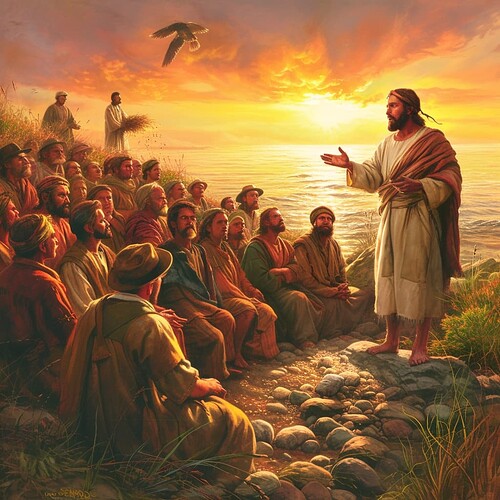 February 8: Mark 4 - Uncovering the Mysteries of the Kingdom
February 8: Mark 4 - Uncovering the Mysteries of the Kingdom
Exploring Parables and the Power of Faith
 Introduction
Introduction
Welcome to our exploration of Mark 4, a chapter rich with stories and analogies that Jesus uses to explain the concepts of God’s kingdom and faith.
 The Parable of the Sower
The Parable of the Sower
Jesus starts by explaining the Kingdom of God’s word through the story of a farmer and different types of soil.
*![]() Key Verse: “But these are the ones sown on good ground. Those who hear the word, accept it, and bear fruit: some thirtyfold, some sixty, and some a hundred.” (Mark 4:20)
Key Verse: “But these are the ones sown on good ground. Those who hear the word, accept it, and bear fruit: some thirtyfold, some sixty, and some a hundred.” (Mark 4:20)
 The Lamp Under a Basket
The Lamp Under a Basket
Here, Jesus highlights the purpose of His teachings and the importance of spreading them.
*![]() Key Verse: “For there is nothing hidden which will not be revealed, nor has anything been kept secret but that it should come to light.” (Mark 4:22)
Key Verse: “For there is nothing hidden which will not be revealed, nor has anything been kept secret but that it should come to light.” (Mark 4:22)
 Key Themes and Reflections
Key Themes and Reflections
1. Understanding God’s Word: Mark 4 emphasizes hearing, understanding, and accepting God’s word. When we prepare our hearts as good soil, the word can take root and bear fruit.
2. The Power of Faith: Even a mustard seed’s worth of faith, Jesus tells us, can grow into the largest plant in the garden.
 Today’s Application
Today’s Application
As modern-day disciples, we are called not only to receive the Word but to evangelize - bringing the light of the Gospel to others. Don’t hide your faith!
 Hidden Gem
Hidden Gem
Did you notice? Jesus often taught in parables, simple stories, to help His listeners understand complex spiritual truths. In today’s societal context, we can utilize the same technique through relatable narratives that convey God’s word.
 Reflective Q&A
Reflective Q&A
![]() Why does Jesus speak in parables?
Why does Jesus speak in parables?
A: Jesus uses parables to make spiritual truths more accessible. They serve as metaphors that use worldly items or incidents to explain divine principles.
![]() What is the significance of “good soil” in the parable?
What is the significance of “good soil” in the parable?
A: “Good soil” represents an open, receptive heart that hears and accepts God’s word, enabling it to grow and produce a plentiful spiritual harvest.
![]() How can I “shine my light” in today’s world?
How can I “shine my light” in today’s world?
A: We shine our light by living in accordance with God’s teachings, displaying love and kindness, and making conscious decisions that align with our Christian values.
![]() Join the Discussion: Share a moment when you witnessed the truth of these parables in your life.
Join the Discussion: Share a moment when you witnessed the truth of these parables in your life.
![]() See You Tomorrow in Mark 5: Join us as we discover the transformative power of faith and the boundless mercy of Christ. Dive deep into the miracles that only belief can unlock.
See You Tomorrow in Mark 5: Join us as we discover the transformative power of faith and the boundless mercy of Christ. Dive deep into the miracles that only belief can unlock.
So, as we journey further into Mark’s Gospel, let’s make an effort to be the good soil in the Parable, welcoming God’s word, allowing it to take root, and bearing fruit in our lives. Let the mysteries of the kingdom live and sprout within us!
